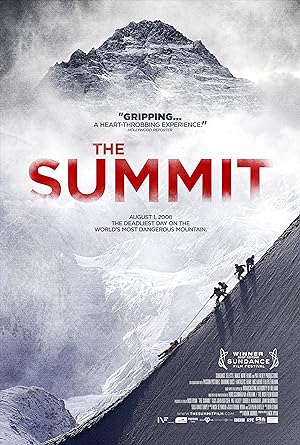The Summit is a documentary that attempts to detail how eleven climbers died on K2, the second highest mountain, during the summer of 2008. I am fascinated with stories about people engaging in extreme activities that I would never do such as mountain climbing. While this documentary is riveting and gorgeous, it is unfortunately not clearly told.
If the filmmaker wants the viewer to be able to distinguish individuals from each other, then the beginning needs to devote some time to profiling each person involved in the historical event. Furthermore documentaries about historical events involving a great number of people should be told in chronological order. Unfortunately The Summit catalogues the first two people killed on K2, profiles a single climber then backtracks to how the climbers prepared to climb K2. The Summit also includes an interview with Walter Bonatti, who was part of an early expedition to K2 without any of the technical expertise or practical experience that these eleven victims had. This interview and an interview with the family survivors of the victims of he 2008 expedition critique the role of press for giving too much information and historical accounts that erase important factors. It was extremely frustrating for a documentary to be concerned with accuracy yet fail to model how to best accomplish that in its depiction of this tragedy.
My intention is not victim blaming because in this particular incident, an avalanche took down the rope, and it is amazing that anyone survived. No single person could have prevented a big ass mountain pulling a Rick James saying, “Frack your rope.” Whether it is documentaries or feature length drama movies based on historical events such as Everest, casting blame seems to be high on the agenda. When casting blame, I have noticed certain common threads in these tragedies. That blame always seems to fall at the feet of the sherpas or the minorities, the Korean climbers in this particular case. I’ve only begun to notice this trend because I’ve watched so many of these kinds of movies about different climbing disasters. I always think that it is interesting that people complain, “It was x’s job to do it. They didn’t do it, or they didn’t do it right.” I live a fairly low stakes life, but when I see someone screwing something up that I can do better and will actually affect me, guess what I do? I jump up and do it my damn self. Why don’t filmmakers ever ask, “Why didn’t you do it yourself once you realized that x was screwing up? Why did you rely on what you knew was shoddy work?” If you can do better, then do better.
How are the sherpas able to run back and forth, make it to camp then go back and rescue people in morning light? If the tourists are such expert climbers, why can’t they just follow them down? Is it because the sherpas have so much experience? In this particular tragedy, a couple of sherpas actually died. I’m not saying that the tourists could do this and chose not to. I just don’t understand how this scenario keeps playing out regardless of location or time period.
I actually appreciated that The Summit actually interviewed one of the sherpas. When the climbers talk about the sherpas, it is in extremes. They are either friends or screw ups. This particular Sherpa, Pemba Gyalje Sherpa, revealed that the climbers treat sherpas like slaves and expect them to do things that are not humanely possible. He also talks crap about the Korean team leader, and I’m inclined to believe him because he can be financially hurt by this revelation. Filmmakers need to stop taking eyewitness accounts as gospel and weigh each story’s credibility so when it is time to tell the viewer what happened, the filmmaker can either try to recreate what he or she believes happened or consciously take a Rashomon approach instead of retroactively raising doubts after telling the story.
The Summit was way too determined to try and find a hero and villains in the midst of this tragedy instead of just telling the story well. It is a fascinating incident that is visually equal to the challenges offered by the mountain, but fails to provide a comprehensive narrative.
Stay In The Know
Join my mailing list to get updates about recent reviews, upcoming speaking engagements, and film news.





